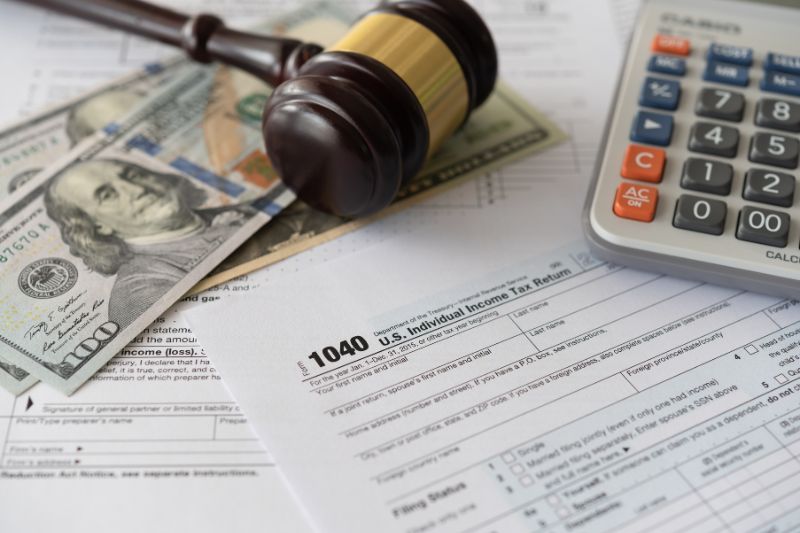What Are the Legal Liabilities of an Accountant

Accountants are regarded as some of the most important individuals in the corporate world. After all, it is the accountant’s responsibility to monitor a company’s finances and ensure everything is in order.
The title comes with some serious job responsibilities. And a negligent accountant could face legal charges from clients, investors or creditors.
In this article, we will look at some of the legal problems accountants commonly face and talk about how they might defend against liability claims.
What Are the Different Accounting Regulations Standards
Several accounting standards have been created by the International Accounting Standards Board (IASB), an international organization responsible for developing and overseeing international financial reporting standards.
While the IASB sets accounting standards for companies that operate in multiple countries, it does not regulate local laws. The country-specific regulations vary depending on the jurisdiction.
In addition to the IASB, other organizations play a role in setting accounting standards and regulations:
The Financial Accounting Standards Board (FASB) establishes accounting standards in the United States. These standards must be adhered to by all accountants to maintain their licenses.
The FASB Codification is the source of authoritative, generally accepted accounting principles (GAAP) and generally accepted auditing standards (GAAS) in the United States. So, if an accountant were to violate any of these GAAPs, they could be subject to disciplinary action from their state board of accountancy. [1]
In the UK, the three primary financial reporting frameworks are the International Financial Reporting Standards (IFRS), UK Generally Accepted Accounting Principles (UK GAAP), and European Union-Endorsed International Financial Reporting Standards.
For instance, while UK GAAP does not require businesses to account for certain assets and liabilities using the fair value technique—a method that uses market prices to measure an asset’s or liability’s worth—IFRS mandates that they do so. Therefore, if an accountant prepared financial statements for a client using UK GAAP for a company that was required to use IFRS, they may be held accountable for any errors.

While in Canada, provincial and territorial institutes of chartered professional accountants oversee the profession. Each province and territory has rules and regulations that accountants must follow.
For example, in Ontario, accountants must adhere to the CPA Ontario Code of Professional Conduct. This code sets out the standards of ethical and professional conduct that all certified public accountants in Ontario must follow. If an accountant were to violate any of these standards, they could face disciplinary action from CPA Ontario.
And in Australia, the Australian Accounting Standards Board (AASB) sets accounting standards everyone must follow. These standards are known as the Australian Accounting Standards (AAS). So, if an accountant were to prepare audited financial statements using any other accounting framework besides AAS, it would make the accountant legally liable.
The Different Types of Legal Liability of an Accountant

As a professional accountant, you need to be aware of the different accounting regulations that are enforced by your state and understand how your actions might contribute—or not—to liability. You may also need to research and understand international regulations if working with clients from other countries.
The most common accountant-related liability is detailed below, along with some suggestions on what can be done if it arises.
Criminal Liability
In the United States, accountant criminal liability generally arises under one of two circumstances:
(1) when an accountant commits a crime in furtherance of or in connection with the performance of their professional services, or
(2) when an accountant knowingly or recklessly makes a material misstatement concerning the preparation, approval, or audit report of financial statements.
Under both circumstances, the prosecutor must prove that the accountant acted specifically to defraud. [2]
In the United Kingdom, Canada, and Australia, the standards for an accountant’s liability are similar to those in the United States. However, unlike in the United States, the prosecutor is not required to prove that the accountant acted with the specific intent to defraud. Instead, it is enough that the prosecutor shows that the accountant acted recklessly.
Breach of Contract
Breach of contract is a legal term that refers to a circumstance in which one party to a contract fails to fulfill its professional duties.
When one party fails to produce the agreed-upon products or services, fails to make a payment, or violates the terms and conditions, this is considered a breach of contract. A contract violation may entitle the other party to damages or relief in specific instances.
Clients and third parties not included in the contract may also be able to sue for damages if the breach harms them.
If you are discovered to have broken a contract, you may face legal consequences. This means you may be required to pay compensation to the other party or parties involved in the contract. The number of damages you pay would be determined by the contract’s specific provisions and the magnitude of the breach.
In some situations, you may also be expected to complete particular tasks or fulfill implied duties mentioned in the contract. If you are found to have breached an agreement, you should get legal counsel as quickly as possible to understand your rights and obligations.
Negligence
You are expected to exercise a certain degree of professional care and skill in your work. If you fail to meet this standard and someone is harmed as a result, you may be held liable for gross negligence.
In the United States, the United Kingdom, Canada, and Australia, there are several ways in which an accountant can be held liable for general negligence.
For example, if you fail to keep clients’ financial statements accurately or submit incorrect tax returns, you may be liable for any losses your clients suffer. Additionally, if you provide your clients with inaccurate or misleading advice, you may also be liable for any losses they incur.
Fraud and Deceit
Fraud occurs when an individual knowingly makes a false representation to obtain some financial benefit. On the other hand, deceit involves making a false registration statement with the intent to deceive another person.
While fraud and deceit can be prosecuted criminally, they can also lead to statutory law liability. This means that if an individual is found to have committed either type of fraud, they may be sued by the person who was deceived. One type of fraud that an accountant may commit is embezzlement.
This occurs when the accountant illegally withholds or misuses funds that are supposed to belong to the client. For example, an accountant may embezzle money by inflating expenses or creating false invoices.
Another type of fraud is tax fraud. This occurs when the accountant provides incorrect information on a client’s tax return to reduce the amount of taxes owed. For instance, an accountant may intentionally omit income or understate deductions to lower the tax bill.
Strategies for Minimizing Legal Risks for Accountants

As an accountant, you are continuously exposed to legal risks. Fortunately, there are several tactics you can employ to reduce those risks. Here are some of the best ways to shield yourself against the legal liability of being an accountant.
Understand Your Role and Responsibilities
There are several ways to minimize your legal liability, one of which is understanding your role and responsibilities.
You must exercise reasonable care when performing your professional duties. This means you must use the skills and knowledge ordinarily expected of someone in your position. If you do not meet this standard, you may be liable for any losses your clients suffer.
Additionally, it is crucial to understand the limitations of your role as an accountant. You are expected to have expert knowledge in only some areas of finance and accounting. If you provide your clients with advice outside of your expertise, you may be liable for any losses they incur.
Research the Applicable Laws and Regulations
Any accountant must research the applicable federal securities act and regulations to avoid legal liabilities. Depending on the jurisdiction, different laws may govern
accounting practices. As such, it is vital to know the specific rules that apply in the jurisdiction where you practice.
Additionally, many accounting firms have their own internal policies and procedures that must be followed. Failure to comply with these policies could result in disciplinary action, including termination. Thus, accountants must research applicable laws and regulations and their firm’s internal procedures to avoid potential legal liabilities.
Another thing to consider is that written laws and regulations are constantly changing. For example, in the United States, the Sarbanes-Oxley Act was enacted in 2002 in response to several
accounting scandals. The act introduced significant changes to how public companies must manage their finances.
Keep Accurate Records

As an accountant, you have legal obligations to your clients and employers. You also have obligations to follow professional and ethical standards. By keeping accurate records, you can help minimize legal liabilities. Recordkeeping can be used as evidence in your defense if you are accused of illegal acts, such as embezzlement. Maintaining accurate records also helps you meet your legal responsibilities.
For example, accurate records will help support your tax return if the IRS audits you. In addition, if you are sued, accurate records can be used to defend yourself against allegations of gross negligence. By taking the time to keep the correct documents, you can help protect yourself from legal charges.
Communicate With Your Clients
It’s also important to have a communication strategy in place to minimize legal liabilities. One way to do this is to have regular meetings with your clients to discuss their businesses. This allows you to ask questions and get clarification on anything that may be unclear.
It also allows you to build a rapport with your clients, making them more likely to come to you with questions or concerns. Communicating with your clients can help minimize legal liabilities and build trust between you and them.
Seek Professional Help When Necessary
When required, seek expert assistance to reduce legal liabilities. You should speak with an experienced lawyer if you have concerns about your legal obligations or believe your client has engaged in criminal activity. You can ensure that you won’t be held responsible for any legal issues by taking proactive measures to protect yourself.
Get Professional Liability Insurance
Another strategy for avoiding legal charges is to carry professional liability insurance. This kind of insurance covers client-incurred losses due to your gross negligence. Professional liability insurance can reduce your legal risks by paying for your defense and any potential financial losses.
Additionally, most plans cover costs like lost income and legal fees. Be sure to choose insurance from an experienced provider that can tailor the coverage to suit your specific needs. This essential step might serve as a safety net if you are sued. [3]
Conclusion
By understanding the different types of liability and the steps you can take to protect yourself, you can minimize your risk of being sued or held liable for damages. While no one likes to think about the possibility of being sued, it is better to be prepared than to be caught off guard if something does happen.
If you have any questions or concerns, don’t hesitate to contact a professional liability attorney. They can help you understand the federal securities laws and written laws passed in your state and how they apply to your specific situation. Stay safe and informed, so you can continue doing what you love without worrying about legalities.
Sources:
STAY ALWAYS TUNED
Subscribe to newsletter
STAY ALWAYS TUNED
Still not sure?
- Don’t spend time on manual work
- Streamline processes with AI
- Automate your invoice flow
- Integrate with the tools you rely on every day












